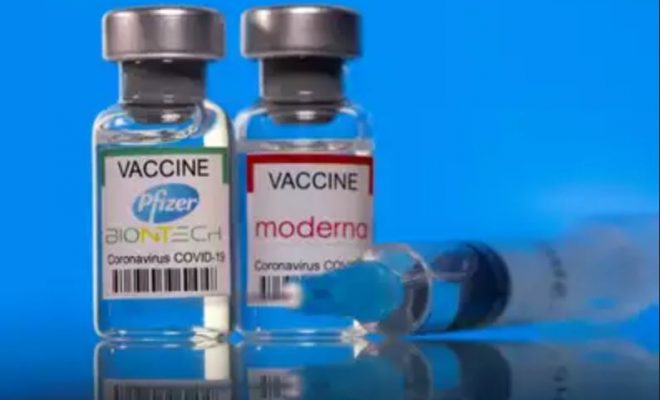Neurologic adverse events among 704,003 first-dose recipients of the BNT162b2 mRNA COVID-19 vaccine in Mexico: A nationwide descriptive study

Abstract
mRNA vaccines against SARS-CoV-2 are remarkably effective. Limited information exists about the incidence of adverse events following immunization (AEFI) with their use. We conducted a prospective observational study including data from 704,003 first-doses recipients; 6536 AEFI were reported, of whom 65.1% had at least one neurologic AEFI (non-serious 99.6%). Thirty-three serious events were reported; 17 (51.5%) were neurologic (observed frequency, 2.4/100,000 doses). At the time of writing this report, 16/17 cases had been discharged without deaths. Our data suggest that the BNT162b2 mRNA COVID-19 vaccine is safe; its individual and societal benefits outweigh the low percentage of serious neurologic AEFI. This information should help to dissipate hesitancy towards this new vaccine platform.Keywords: Adverse event, COVID-19, SARS-CoV-2, Vaccine, BNT162b2Go to:
1. Introduction
Since the coronavirus disease 2019 (COVID-19) pandemic began, >127 million infections and > 2.7 million deaths have been reported worldwide [1]. To reduce the burden on healthcare systems, massive vaccination is, therefore, a top global priority. Shortly after demonstrations of the BNT162b2 mRNA COVID-19 vaccine safety and efficacy, Mexico granted emergency approval for its use and started widespread vaccination (mainly among healthcare workers) on December 24, 2020 [2]. Mexico has an ongoing passive surveillance system assessing adverse events potentially related to immunizations, including COVID-19 vaccines [3]. Within days, the surveillance system identified a suspicious cluster of serious neurologic adverse events following immunization (AEFI) among first-dose recipients, prompting a thorough analysis of every potentially serious AEFI by a multidisciplinary group of physicians.
To this day, there are only two published papers describing at least one neurologic adverse following vaccination with the BNT162b2 mRNA vaccine against severe acute respiratory syndrome coronavirus 2 (SARS-CoV-2). A worldwide randomized clinical trial (RCT) evaluating its safety and efficacy reported a headache frequency > 30% [4], and a descriptive study from the United States conducted by the Centers for Disease Control and Prevention (CDC) using data obtained from their Vaccine Adverse Event Reporting System describes a lower frequency of 21.8% [5], both among first-dose recipients. However, none of those studies described other serious or non-serious neurologic AEFI.
This report on first-dose recipients of the BNT162b2 mRNA COVID-19 vaccine from December 24, 2020, to February 12, 2021, in Mexico, aims to describe the systemic, and potential neurologic AEFI, focusing on serious neurologic events. This information has potential implications for increasing awareness of vaccine safety among Latinx, an underrepresented group in RCTs that has historically shown skepticism for novel vaccines [6,7].Go to:
2. Methods
2.1. Study design and population
This prospective observational cohort study on all adverse events following the first dose of the BNT162b2 mRNA COVID-19 vaccine from December 24, 2020, to February 12, 2021, in Mexico, was performed using a dataset comprising daily updated information on AEFI, obtained from the General Board of Epidemiology (in Spanish, Dirección General de Epidemiología) of the Mexican Ministry of Health. The cut-off date for this data and follow-up of hospitalized cases was February 18, 2021. The Mexican Epidemiological Surveillance System monitors AEFI throughout >23,300 medical units, distributed across the country, including public, social security-managed, and private units. This is a passive surveillance system where events are reported either by the health institution or directly by the recipient. Surveillance is carried out for 30 days after vaccine administration; vaccine-specific, clinical, and epidemiological data are recorded. A printed and web-based operational manual guides on the definition, reporting, and follow-up of AEFI. When AEFI are identified, evaluation and follow-up are performed at the local level, where they are characterized as either non-serious or serious [3]. All potentially serious AEFI were evaluated by an ad-hoc committee. The study was revised and approved by the Ethics and Research Committees of the Instituto Nacional de Ciencias Médicas y Nutrición Salvador Zubirán (Ref. NER-3667-20-21-1) and the Mexican Ministry of Health. Due to the nature of the study, both Committees waived the need for signed informed consent.
2.2. Definitions of adverse events following immunization
Following the World Health Organization (WHO) operational definition [8], in Mexico, non-serious AEFI are events attributable to and occurring in the first 30 days after vaccination and immunization that a) do not pose an imminent risk of death; b) disappear without treatment or only require symptomatic treatment; c) do not require hospitalization; and, d) do not cause long-term disability, including local (e.g., rash, swelling, injection-site pain or infection that is treated on an outpatient basis), or systemic (e.g., fever, headache, malaise, muscle and/or joint pain or Diarrhea) events. In contrast, serious AEFI are those occurring in the first 30 days after vaccination, presenting with any clinical manifestation that meets one or more of the following criteria: a) lead to death; b) put life in imminent danger; c) lead to persistent or significant disability; d) in the case of pregnant women, cause in-utero malformations; or, e) require or prolong in-hospital treatment [3].
2.3. Definitions of neurologic adverse events following immunization
For this analysis, we defined neurologic AEFI as those presenting with any sign or symptom potentially related to central or peripheral nervous system dysfunction; we, therefore, considered AEFI as neurologic whenever they included at least one of the following: headache, motor symptoms, sensory symptoms, focalizing signs, and altered mental status (including syncope). From the clinical notes, we defined weakness as a construct using the following search terms taken from the clinical notes: paresis, weakness, diminished strength, lack of strength, paralysis, or a combination thereof. Similarly, a construct of sensory symptoms included the following: paresthesia, dysesthesia, numbness, pinprick, tingling, or a combination thereof. Headache, sensory symptoms, weakness, and syncope were considered non-serious neurologic adverse events unless otherwise defined by the medical personnel or if fulfilling the definition of serious AEFI. Guillain-Barré syndrome (GBS), acute transverse myelitis, seizures, and acute palsy or paralysis were confirmed by a neurologist and considered serious neurologic adverse events.
2.4. Data collection
We obtained de-identified data for all AEFI, including age, sex, pregnancy (self-reported), history and type of allergies (drugs, food, or other); history of confirmed SARS-CoV-2 infection by either real-time reverse transcription-polymerase chain reaction (RT-PCR), or antigen tests; the history of non-SARS-CoV-2 infection ≤15 days before vaccination; occupation; vaccine-related symptoms (assessed by the attending physician of the event); interval in minutes from vaccine receipt to first symptom onset; AEFI-related relevant clinical notes by the medical personnel; type of AEFI; as well as hospitalization requirement, including clinical outcome and hospital length of stay (LOS). At least two researchers (MG-G, AA, LH-V, AE-O, MMS-A, SIV-F.) independently reviewed all data for the constructed and non-constructed variables, and a third researcher adjudicated any difference in interpretation between the primary reviewers.
2.5. Statistical analysis
We compared the characteristics between vaccine recipients who developed neurologic AEFI and those who did not. Continuous variables are reported as median with interquartile range (IQR), and categorical variables are presented as frequencies and proportions. Analyses of differences between categorical variables were performed with the X 2 or Fisher’s exact tests as appropriate. Differences in non-parametric continuous variables were assessed with the Mann-Whitney U test. We calculated the incidence proportion of neurologic adverse events per 100,000 administered doses. Variables with missing data were analyzed and presented separately. All values were two-tailed and considered significant when the P-value was <0.05. Statistical analyses were performed using IBM SPSS Statistics, version 26 (IBM Corp., Armonk, NY, USA).Go to:
3. Results
From December 24, 2020, to February 12, 2021, 704,003 first doses of the BNT162b2 mRNA COVID-19 vaccine were administered in Mexico; 188,349 (26.8%) to women and 515,654 (74.2%) to men. During that period, the Mexican Epidemiological Surveillance System received and processed 6536 (0.5%) reports of AEFI. Among all reported AEFI, 6503 (99.5%) were classified as non-serious, and 33 (0.005%) as serious (4.7/100,000 doses). The median age of the vaccine recipients who reported AEFI was 36 (IQR, 30–44) years; 4984 (76.3%) were women (Table 1 ); six of them were pregnant, but none develop serious AEFI. Information on allergy history was available from 5847 cases; among these, 5825 (99.6%) of those developing AEFI had a positive history of allergy. Information on the history of SARS-CoV-2 infection was available to form 6411 recipients; of those, 1763 (27.5%) had a known history of COVID-19.













